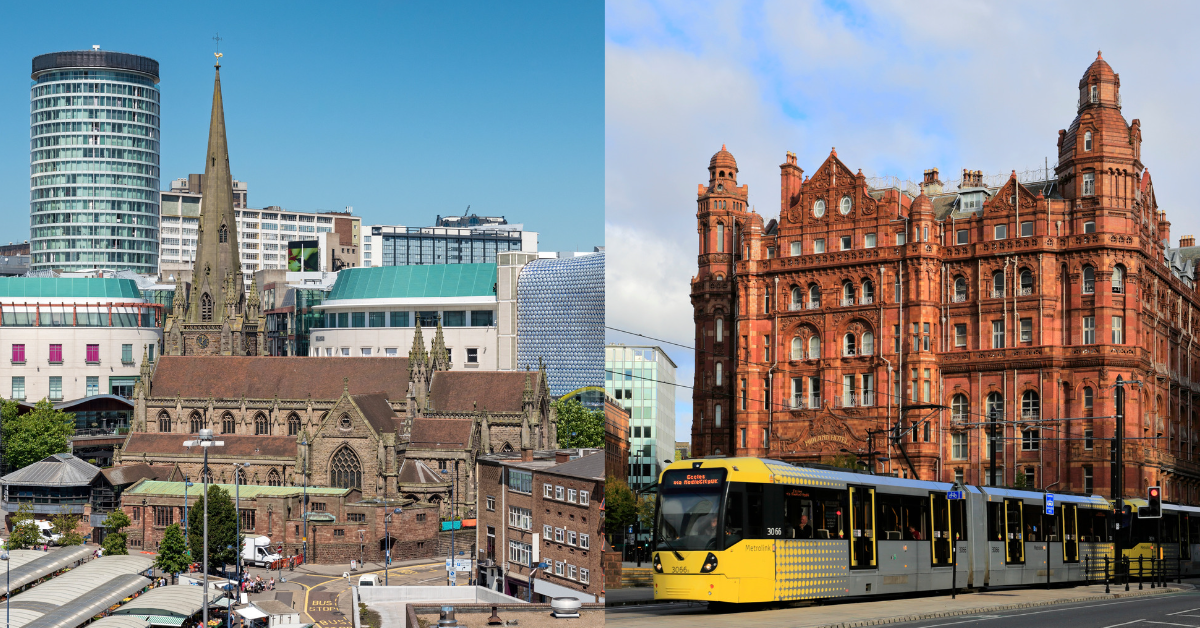
The Government’s growth-oriented policies are increasingly focused on big cities, while levelling up worries about redistribution. This is a helpful distinction.

Reflections from our 'In Conversation’ events last week with Andy Burnham, Mayor of Greater Manchester, and Andy Street, Mayor of the West Midlands, on new trailblazer devolution deals announced in the Spring budget.
First announced in the 2022 Levelling Up White Paper, the trailblazer deals generated a lot of interest as Greater Manchester and the West Midlands were invited to negotiate devolution deals with Whitehall, showing the Government’s evolving approach to the Levelling Up agenda.
After months of negotiations between central government and Mayoral combined authorities, Chancellor Jeremy Hunt formally announced the trailblazer deals for Greater Manchester and the West Midlands in the March Budget, framing it as part of the Government’s plan to level up wealth generation and opportunity everywhere. The deals have been welcomed across the board for giving both regions expanded responsibility across a variety of policy areas, from skills to transport to housing.
Last week Centre for Cities held two ‘In Conversation’ events with Andy Burnham, Mayor of Greater Manchester, and Andy Street, Mayor of the West Midlands, to reflect on the trailblazer devolution deals – what the deals mean for their areas, their priorities for the new powers and the future of devolution across the country.
Read some key reflections from the events below.
To no surprise, both Mayors took pride in the agreed trailblazer deals, hailing them as a distinctive breakthrough in levelling up their respective areas as well as progressing the devolution agenda in England.
Street’s opening remarks reflected that the deals proved a breakaway from a 100-year trend towards centralisation in England, now the most centralised country in the OECD. Burnham saw the deals as a significant milestone towards improving the governance of the country, through reconfiguring how central and local government work and interact.
Greater Manchester and the West Midlands being chosen as the first areas to negotiate more significant devolution through the deals was recognised by both mayors as a recognition of the economic importance to the country, and to their institutions being more mature and trusted due to their strong track record in delivering previous deals struck with government.
Both mayors raised the importance of individual politicians within government in championing the devolution agenda and ‘making sure the deals happened’. Street pointed to Jeremy Hunt while Burnham spoke of Michael Gove.
Both also recognised and emphasised a wider shift in thinking that is taking place place across government, with more voices in more departments understanding that devolution can bring about positive change. Burnham added that devolution naysayers are now in the minority.
Despite this progress both mayors stressed that the civil service still has a good way to go to change the way it works and to be less ‘Whitehall knows best’.
Both mayors highlighted the proposal to create single pots for the two areas – to be agreed at the next spending review – as significant element of their deals. Burnham said the single pot would enable Greater Manchester to develop the projects and interventions that meet its own needs, giving as an example the potential for an integrated skills system for Greater Manchester.
The way in which national government departments waste more money than local authorities was also discussed. Both mayors argued that money is better spent, and projects more quickly delivered, by those closer to the ground. Street emphasised that being closer to the scene of action allows for better decision making. But that does not mean there is no role for government. Government is still needed to set frameworks and regulations, and support local authorities in setting long-term directions.
Both Mayors also agreed that, with greater resource and power, greater levels of accountability will be necessary, and what shape this would take remains up for consideration.
Both leaders were optimistic about the future of devolution in other parts of England, believing that both parties increasingly understand that devolution agenda is irreversible – with Burnham calling it an ‘ongoing success story.’ Street predicted devolution will be an important issue in the upcoming general election and will be a crucial lever for the winner as they seek to deliver change.
Burnham explained that in the twenty first century economy, it is cities who are driving change and growth. Yet he pointed to London being the only part of England having recovered from the impacts of Covid-19, and so to truly achieve the ambitions of the Levelling Up White Paper, there needs to be further commitment beyond the trailblazer deals.

The Government’s growth-oriented policies are increasingly focused on big cities, while levelling up worries about redistribution. This is a helpful distinction.

The data shows that devolution deals will widen differences between places, but this should not be a source of concern

Centre for Cities’ Realising Regional Growth event brought together Lord Sainsbury, Andy Burnham and Gordon Brown, alongside other local leaders to discuss the future of Manchester’s economy and its potential as an innovation hub.

The new mayors have been sure-footed and are fulfilling expectations
Leave a comment
Be the first to add a comment.